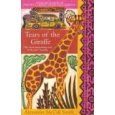
Upstairs, I am re-reading Tears of the Giraffe, the second in The No. 1 Ladies' Detective Agency series.

While downstairs, I have started on The World According to Bertie.
Two works of fiction at the same time and one of them downstairs!
As both books are from the pen of Alexander McCall Smith, you might wonder why I am finding this so difficult. His books are gentle and humorous and not at all challenging reading. The problem is, as I pointed out in a previous post, that I have to read these books in the appropriate accent; Bertie requires genteel Edinburgh(_ian? or _ese?) while Mma Ramotswe is most assuredly from Southern Africa. A momentary lapse of concentration and the results are painful either on the internal ear or larynx.
There is also the sensitive issue of class. I hesitate to say this but those who frequent Edinburgh's Cafe St Honore might well resent being below stairs while the proprietor of Tlokweng Road Speedy Motors resides above them. What a dilemma!
My last venture into genteel Edinburgh society was to attend a family wedding in Dundas Castle. Members of the immediate family stayed overnight in the castle and the MM and I were given a suite of rooms slightly larger than our cottage. I've mislaid the disc with the photographs I took but I'll show you some grainy scanned pics just to prove we were there!

These pictures were taken in our bedroom.
You can see most of the other rooms on the castle's website. The wedding itself was in the Auld Keep. We climbed the spiral stone stairs to the chapel at the top, stopping halfway up for champagne by a roaring fire.
As we descended to return to the castle for the wedding breakfast, a piper played on the roof of the Keep and a harpist was stationed on the main staircase.
I do apologise for the poor quality of the photos but they are all I have and I think you might suspect me of telling fairy stories without this evidence of my weekend in a real castle!
 As you can see, Edinburgh folks live in a world far removed from Mma Ramotswe and Mr J.L.B. Matekoni and I may well be guilty of a serious breach of etiquette in reading about them at the same time.
As you can see, Edinburgh folks live in a world far removed from Mma Ramotswe and Mr J.L.B. Matekoni and I may well be guilty of a serious breach of etiquette in reading about them at the same time.
Mighty impressive m. You both look quite gorgeous and terribly upper-crust.
ReplyDeleteOld non-digital photos seems so quaint -- fitting for a wedding in a real castle. To reference a string on another post, the wrong one as it turned out, I hope you held up your side by not only looking the part, but conversing in the appropriate voice.
Thank you, e. We did our best! The Highland Fling was a bit of a challenge in those very high heels, though.
ReplyDeleteI don't know why the photographs came out so badly. I tried scanning the perfectly good prints but the effect was as you see it - grainy and discoloured. If I find the disc the originals are on, I'll replace them with better copies.
I've gotten pretty good results with a cheap two year old HP All-in-One.
ReplyDeleteHere's a scan of a picture I took of Lake Louise in Alberta Canada about 20 years ago. The colors aren’t true, especially the poppies which are intensely red, just like my poppy logo.
It's one of the most beautiful places we’ve ever been.
Here's a more manageable sized picture Lake Louise
ReplyDeleteIt certainly looks very beautiful, e.
ReplyDeleteI think that a 'soft Edinburgh brogue' is the phrase you were looking for.
ReplyDeleteI'll let that be upon your head, Stephen. My Edinburgh kin (who frequent castles!) would say 'brogue' applies only to the Irish. Since I have a lot of Irish ancestors as well as Scots, I am quite happy to adopt the term.
ReplyDeleteBhròg( sometimes bròg)in Scots, bróg in Irish, castle-dwellers or not.
ReplyDeleteGo raibh maith agat. Tóg go bóg é.
I am very impressed, Stephen. I will try it out on our Constable of Edinburgh on our next visit.
ReplyDelete